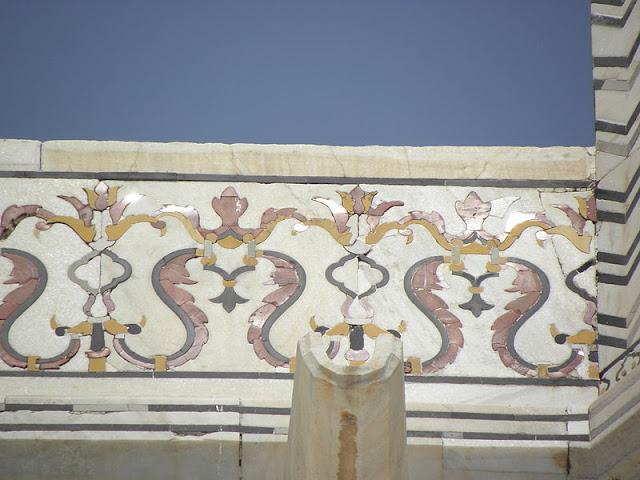Southern view of the Taj Mahal
The Taj Mahal is a mausoleum located in Agra, India. It was built by Mughal emperor Shah Jahan in memory of his third wife, Mumtaz Mahal. The Taj Mahal is widely recognized as "the jewel of Muslim art in India and one of the universally admired masterpieces of the world's heritage."
Taj Mahal is the finest example of Mughal architecture, a style that combines elements from Persian, Turkish and Indian architectural styles.
Walkways beside reflecting pool
In 1983, the Taj Mahal became a UNESCO World Heritage Site. While the white domed marble mausoleum is the most familiar component of the Taj Mahal, it is actually an integrated complex of structures. The construction began around 1632 and was completed around 1653, employing thousands of artisans and craftsmen. The construction of the Taj Mahal was entrusted to a board of architects under imperial supervision, including Abd ul-Karim Ma'mur Khan, Makramat Khan, and Ustad Ahmad Lahauri. Lahauri is generally considered to be the principal designer.
The Great gate (Darwaza-i rauza)—gateway to the Taj Mahal
Interior of the Taj Mahal mosque
Taj Mahal mosque or masjid
Jali screen surrounding the cenotaphs
Cenotaphs, interior of Taj Mahal
Arch of Jali
Delicate pierce work
Calligraphy on large pishtaq
Spandrel detail
Incised painting
Reflective tiles normal exposure
Viewed from the east
Finial
Main iwan and side pishtaqs
Tombs of Shah Jahan and Mumtaz Mahal
Detail of Jali
Southern view of the Taj Mahal
The Taj Mahal seen from the banks of river Yamuna
 06:53
06:53
 homesweethome
homesweethome






























 Posted in:
Posted in: 








0 意見:
Post a Comment